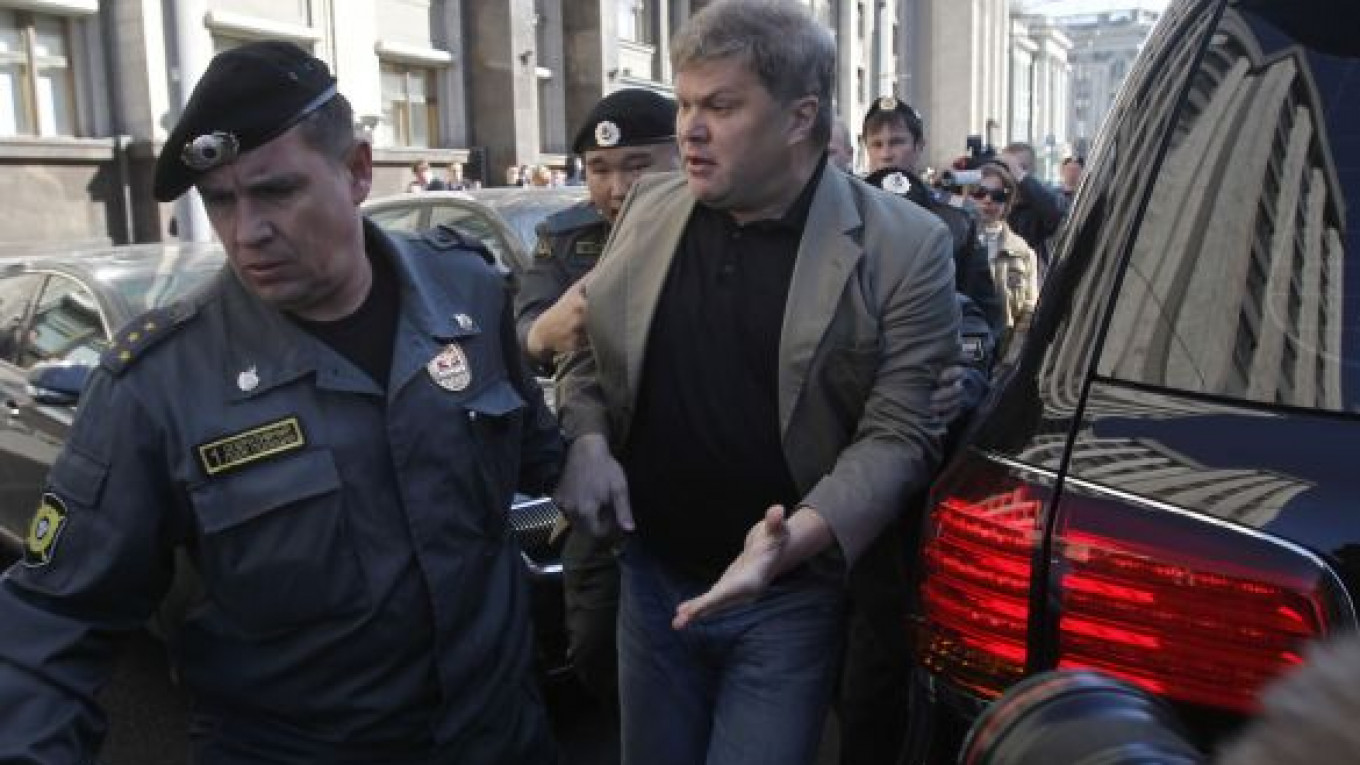The United Russia-controlled State Duma on Tuesday approved an amendment to dramatically hike fines for disorder at public rallies, as part of a contentious draft law that activists say damages the right to free assembly.
Groups could be fined up to 1 million rubles ($30,000) if protests injure people or damage property, while individuals face a maximum 300,000 ruble fine or 200 hours' community service, under plans backed by a narrow majority of 240 of the Duma's 450 deputies. It needed 226 votes to pass.
Current fines range from 1,000 to 5,000 rubles.
The amendment opened the doors to a long-running and boisterous debate on the Duma floor, in which opposition party deputies put forth numerous procedural hurdles to slow down bringing the entire bill to a vote on the second reading.
The full text of the law was still being debated as The Moscow Times went to press. If it passes a third reading in the Duma, it then would go before the Federation Council and finally on to the president's desk.
An anonymous Kremlin source told RIA-Novosti that the law would come into force before June 12, Russia's National Day, when opposition forces plan a large protest march against President Vladimir Putin.
The law was drafted by United Russia deputies after a May 6 protest on the eve of Putin's inauguration ended in violent clashes with about 400 people arrested.
Police detained scores of protesters before the vote Tuesday, including activists from the Solidarity movement and the Other Russia. Sergei Mitrokhin, leader of the liberal Yabloko party, was among those bundled away by officers.
“We didn't break any laws. We had one poster and some leaflets. We wanted to get citizens to come to the sanctioned picket at 11 a.m.,” Mitrokhin told Interfax.
Opposition deputies from the Communist Party, A Just Russia and the Liberal Democrats spoke out against the bill.
Police have since started criminal actions against some of the May protesters for alleged violence and a case of “suffocation.” One 18-year-old woman accused of throwing a paving stone at police and inciting a riot faces an eight-year jail term.
Some activists have claimed that police orchestrated the clashes, while others reported people being arrested for simply wearing a white ribbon — the symbol of the protest movement.
The president's human rights council has called on Putin to veto the protest law. Mikhail Fedotov, head of the council, wrote to Duma Speaker Sergei Naryshkin on Monday, urging him to delay the second reading “to allow the widest possible civic discussion,” according to a copy of his letter published online.
Prime Minister Dmitry Medvedev said in a TV interview aired on the eve of the Duma debate that protesters should face administrative charges rather than criminal punishment and that fines should not be “extremely big.” Putin has previously argued that the law would strengthen democracy.
With the law being fast-tracked through the Russian legislative process, protesters taking part in next week's March of Millions against Putin on June 12 could risk hefty fines.
Organizers' hopes to mass in the center appeared dashed when an aide to the Moscow mayor told Interfax that it would not be possible to stage the march inside the Garden Ring.
A Message from The Moscow Times:
Dear readers,
We are facing unprecedented challenges. Russia's Prosecutor General's Office has designated The Moscow Times as an "undesirable" organization, criminalizing our work and putting our staff at risk of prosecution. This follows our earlier unjust labeling as a "foreign agent."
These actions are direct attempts to silence independent journalism in Russia. The authorities claim our work "discredits the decisions of the Russian leadership." We see things differently: we strive to provide accurate, unbiased reporting on Russia.
We, the journalists of The Moscow Times, refuse to be silenced. But to continue our work, we need your help.
Your support, no matter how small, makes a world of difference. If you can, please support us monthly starting from just $2. It's quick to set up, and every contribution makes a significant impact.
By supporting The Moscow Times, you're defending open, independent journalism in the face of repression. Thank you for standing with us.
Remind me later.






